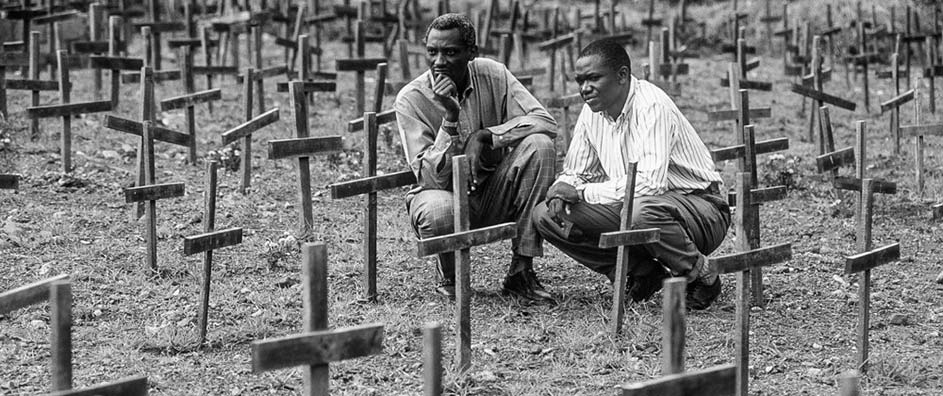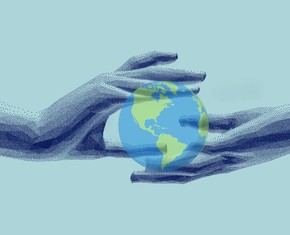The views expressed in our content reflect individual perspectives and do not represent the authoritative views of the Baha'i Faith.
Valentina was 13 years old—the same age as Anne Frank during the Holocaust—when the genocide began in Rwanda. Valentina’s family was Tutsi, the ethnic minority targeted during the genocide. Because of this, as news of the mass killings spread, her family made the difficult decision to leave their home. They packed what few belongings they could fit in their suitcases and walked to the safest place they could think of—their community church. Thousands of other Tutsi families joined them, praying that they would be safe.
In just a matter of days, Rwandan soldiers and mobs of civilians, including Valentina’s own neighbors, had surrounded the church. Armed with grenades, clubs, and machetes, they systematically killed the men, women, and children hiding inside.
Valentina watched in shock as her parents were brutally murdered. With death seeming inevitable, she lay down next to her parents’ lifeless bodies, hoping to die. This saved her life. The militias mistook her for dead and, soon, left the church.
Valentina hid in this church, among the dead bodies of her family, her friends, and her neighbors, for 43 days. At times, she thought about leaving. But since most of her family members had been murdered and her community had been completely destroyed, she didn’t know where else to go.

Today, Valentina lives here, in the United States. Although still haunted by the horrible memory of the genocide, Valentina considers herself lucky because she survived. Up to one million others did not. This unimaginable number doesn’t even begin to take into account the millions of people forced to flee their homes, the hundreds of thousands of women and girls who were raped, or the many orphans who were left behind.
We like to tell ourselves that genocide is rare. But, in reality, Rwanda is one of many countries where genocide took place during the past century. In fact, more people were killed in genocide during the 20th century than in that century’s world wars.
We may never know the impact that this tremendous loss has had on our world. Just think of the people—killed by genocide—who could have been scientists, artists, activists, teachers, or a student like Valentina is today.
This loss of lives—and in turn loss of culture—must be stopped. I believe that it can be. In fact, it is OUR responsibility to eradicate genocide—yours and mine.
This is a huge responsibility, to say the least. In order to do this, in order to eradicate genocide, we have to know at least three main things: 1) what it is; 2) why it happens; and 3) how to respond.
Let’s begin with a reasonable definition of genocide. Although genocide has existed for centuries, and even has occurred here in the United States, the term genocide is relatively new. A Polish-Jewish lawyer named Rafael Lemkin created the concept in the wake of the Nazi Holocaust.
Lemkin combined the Greek word “genos”—which means group—with the Latin suffix “cide,” which means murder. In its simplest form, Lemkin proposed that genocide is the conscious destruction of a group of people.
Lemkin worked tirelessly to promote his new concept—and succeeded. In 1948, many countries came together through the newly-formed United Nations to ratify an international treaty outlawing genocide. This treaty formally adopted Lemkin’s term in the wake of the Nazi genocide of the Jewish people. In doing so, it took the first step toward eradicating genocide—naming it.
The world leaders naming genocide also vowed to prevent genocide from occurring in the future. The phrase “Never again” echoed throughout the world, and they agreed that the world would not see genocide again. Today, the international community has failed to achieve that goal. In fact, right now, today, people in the Darfur region of Sudan are enduring genocide. This violence, which began in 2003, joins the growing list of genocides that have occurred since the Holocaust.
This means that while naming and recognizing genocide as an international crime was an important first step, it was simply not enough—we must also understand it, reject it as a matter of conscience and unite to prevent it. Baha’is believe that only world unity—the oneness of all people and all nations—can possibly bring those conditions about:
…until the minds of men become united, no important matter can be accomplished. At present universal peace is a matter of great importance, but unity of conscience is essential, so that the foundation of this matter may become secure, its establishment firm and its edifice strong. – Abdu’l-Baha, Selections from the Writings of Abdu’l-Baha, p. 297.
This essay came from a TED talk given by Hollie Nyseth Brehm which can be watched here.
Next: Why Genocide Happens, and What Can Stop It
















Comments
Sign in or create an account
Continue with Googleor